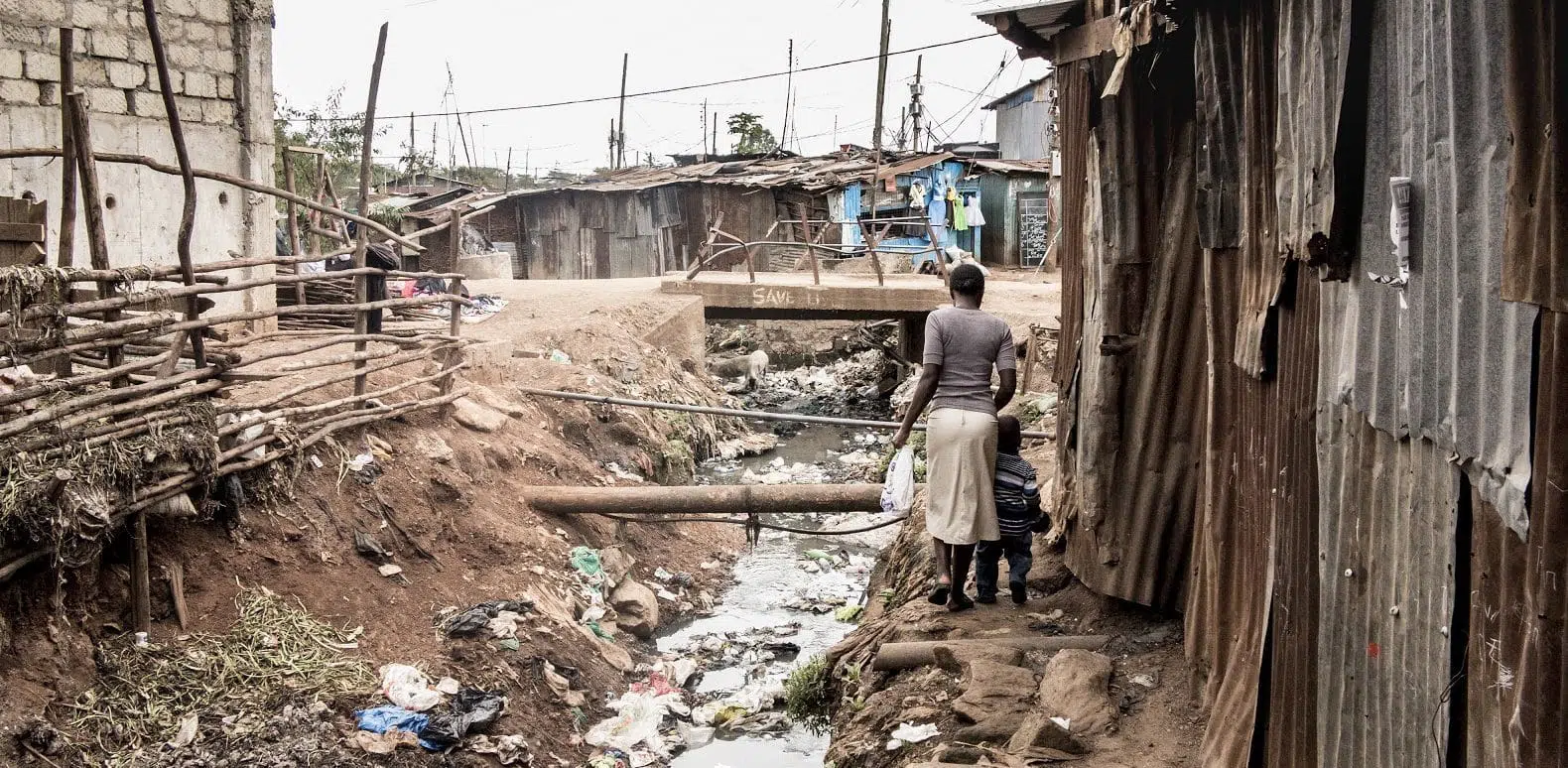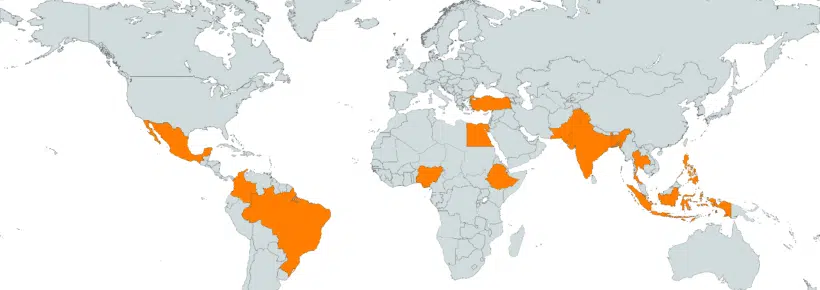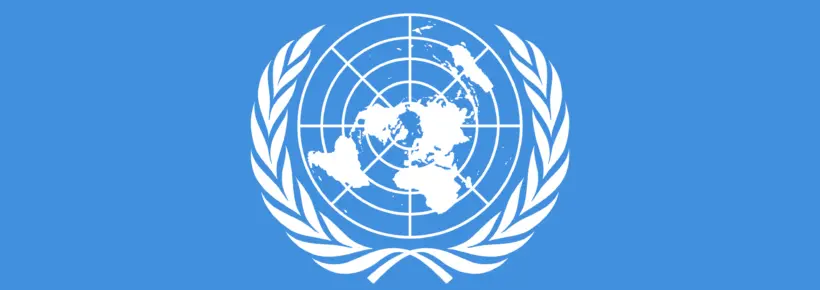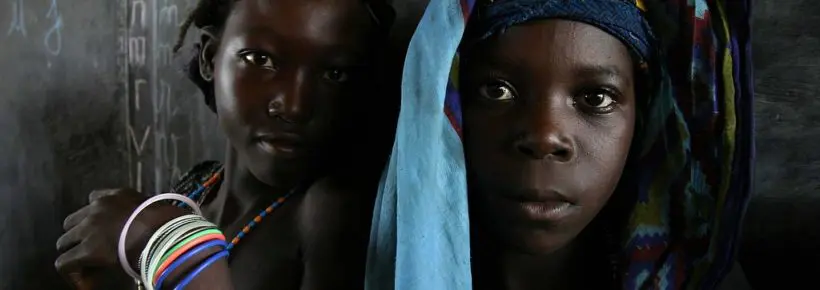Day after day we hear the phrase “population control.” We hear laments that the planet is overcrowded and running out of resources. It seems that many people care more about the planet than the human beings who inhabit it.
Among the solutions to this problem, they say, is the idea that we should limit the amount of people on the planet. But that is not a good or viable solution. In fact, it just introduces a whole new set of problems.
While of course we must take care of the planet and do our best to conserve resources and reduce pollution, we must never do so at the expense of human beings.
So, what are we to do when we hear talk of overpopulation? How do we combat the argument that large families, especially in developing countries, are detrimental rather than beneficial to society?
We do so with education.
How the West Controls Population Growth in the Developing World
Though the US Department of State’s website on population claims that “the U.S. does not endorse population ‘stabilization’ or ‘control’” and that “the ‘ideal’ family size should be determined by the desires of couples, not governments,” the US is a major contributor to organizations that seek to control populations via birth control, sterilization, and abortions.
The State Department’s website explains that “the U.S. strongly opposes coercive population programs.” And therein lies the caveat. While organizations such as Marie Stopes have been investigated or suspended from countries for performing illegal abortions and sterilizations, other organizations seek to make mindset changes by convincing people that multiple children are harmful, that children hold women back from reaching their potential, and that multiple children keep families from climbing out of poverty.
But inhabitants of other countries, such as those in Africa, tell a different story. Obianuju Ekeocha is an African woman who started an initiative called Culture of Life Africa. According to the website, “The threat of the Culture of Death is now real and imminent as we are beginning to see the undeniable attempts to limit, suppress and even destroy the source of human life. This is coming into Africa in the form of population control measures being emphatically proposed, promoted and propagated from one nation to the next.”
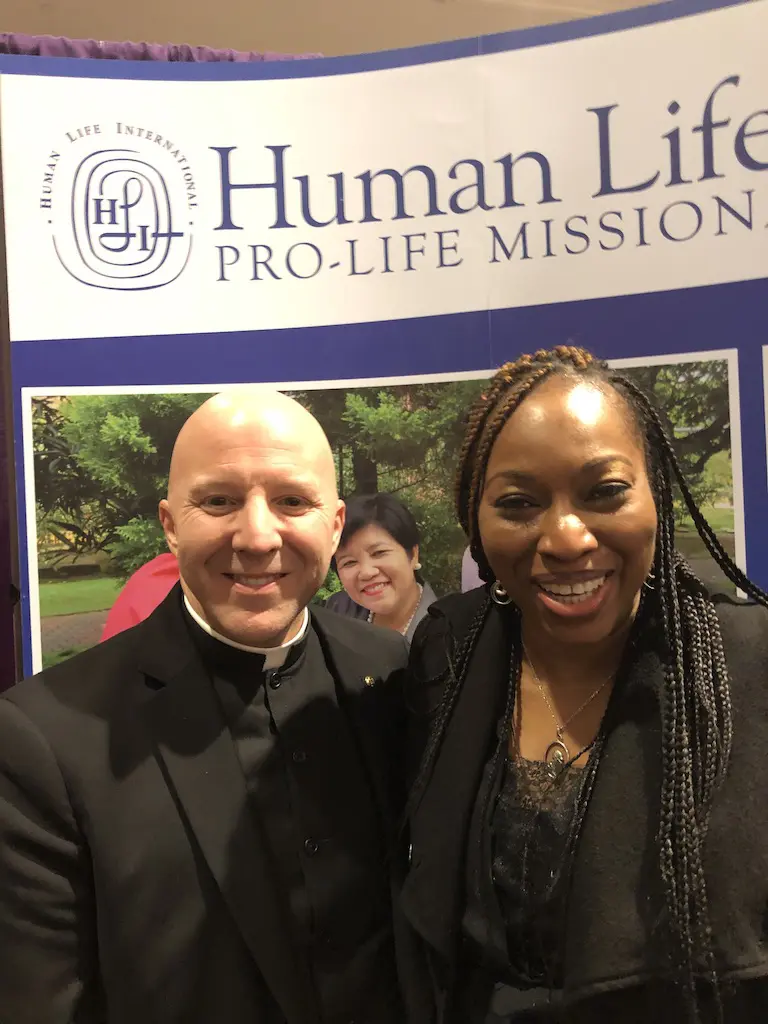
L to R: Fr. HLI President Fr. Shenan J. Boquet with Culture of Life Founder Obianuju Ekeocha at the March for Life – Washington, D.C. 2019
Culture of Life Africa is “a heartfelt cry for people of good will from around the world to consider . . . how the introduction and promotion of the selfish and superficial anti-life culture is sure to unleash irreparable damage and carnage in Africa where new life in the womb brings hope to the hearts of many and where communal family life gives strength and fortitude to struggling men and women to prevail against all odds.”
The site explains that African nations have seen “astronomical amounts of money being raised by rich western philanthropists in order to ‘donate’ to poor nations solely for the purpose of reducing the ‘burdensome’ fertility of their women,” and that abortion lobbyists push African leaders toward legalizing abortion in their countries.
To hear Obianuju Ekeocha’s story is to truly understand the plight of people in developing countries and the manipulation they face as western cultures attempt to impose their beliefs on indigenous peoples.
It is a travesty that we must not only be aware of but fight against.
How Did We Get Here?
Proponents of population control argue adamantly that there are too many people on the planet and that resources will someday be scarce. Yet, we can look at fertility rates and understand that we are not in a dire situation—at least not in the way population control advocates think.
According to a National Catholic Register article, the worldwide fertility rate dropped from 4.7 in 1950 to 2.4 in 2021. That’s a huge decline! It’s expected to decline even further over the next 40 years. The article reports that “every industrialized nation has been at below-replacement fertility for some time.” For example, the US is currently at 1.78 births per woman, which is far below the replacement level of 2.1.
Why is this number so low? It’s low due to a combination of birth control, abortion, couples starting families later in life, and the general mindset that large families are burdensome.
The NCR article reports that a little less than half of the world’s population of women of childbearing age now use some form of artificial contraception. Not only that, but there are 73 million abortions every year.
Add that mentality to the fear of climate change and the fear that people are harming the planet, and you have a recipe for a culture that seeks to destroy children under the guise of sustainability.
Sustainable Development Goals
In 2019, the United Nations Department of Economic and Social Affairs released an article explaining that UN member states agreed to implement a plan on population and development, with the intention of achieving what it called “sustainable development goals.” These countries reaffirmed the commitment they made in 1994 at the International Conference on Population and Development to implement the objectives of the Programme of Action.
The goals of this Programme of Action include laudable ones such as reduced child and maternal mortality, advances in gender equality, and increased life expectancy. But they also included increased access to “sexual and reproductive healthcare.” And by that, it means, of course, contraception and abortion.
According to the article, access to contraception and abortion is “key for sustainable development.” It then quotes UNFPA Goodwill Ambassador Ashley Judd, who said that “sexual and reproductive health of girls and women are at the heart of poverty eradication and sustainable development.” In other words, we must destroy families in order to save the planet.

Planet Blue Planet World Space Earth Globe
This is the mentality Obianuju Ekeocha is fighting so hard against.
A 2019 Population Matters article addresses the belief that population growth and consumption are the “two main causes of global warming.” Cowritten by the organization’s director, this article asserts that the population growth between 1960 and 2000 contributed to increased pollution, overcrowding in cities, and a greater demand for water and land. The authors then state that the existing research into how our planet can sustain the growth of people “fails to quantify the benefits of minimizing further population increases.”
It goes on to say that an additional sustainable goal would be to “dampen population growth” by promoting funding for contraception and abortion, which they say has a “proven track record of success, not only in reducing births rapidly, but also in advancing the empowerment of women and spurring economic progress.”
The authors state that there would be no “coercive” measures needed but that a “wider awareness of the linkage between family size and ecological sustainability can help parents recognize the benefits of having fewer children.”
In other words, these groups should convince women that children are not only a detriment to their individual families but to society and to the planet. And these organizations believe that this “empowers” women or frees them from the “bonds” of family. Yet all it really does is make them beholden to a daily pill, convince them to deny their femininity, and make children their enemies.

Grace and Emil Hagamu of HLI Tanzania push back against contraceptive propaganda on Radio Maria.
The Abusive Cycle of Population Control and Poverty
A closer look at these sustainable goals gives us a little deeper explanation of each of them. Under the heading Gender Equality, the concept of empowerment for women and girls is explained. One of the methods of empowering them is to “ensure universal access to sexual and reproductive health and reproductive rights.”
The article concludes by saying that, while reproductive rights and family planning are part of these sustainable goals, none of them comes right out and says that they must be used to reduce population growth. The authors hope to make that change, saying that this can then lead to reduced birth rates.
The organizations that promote abortion and birth control for reasons of attempting to reverse climate change also often advocate for halting development in poor countries by suppressing their populations and discouraging investment in energy infrastructure. Economic growth requires a certain number of the population to be of working age (i.e., not a child and not an elderly person). When people can work toward the betterment of the community, city, or country, this strengthens the infrastructure. But when organizations seek to reduce the population, this decreases in the number of people who can work and who can build strong families weakens the economy, which then keeps poor people poor.
This endless cycle of poverty threatens the well-being of those who are born, but it also gives fodder to those who are pro-abortion, as they think: How could all these poor people afford a baby? And thus they conclude that abortion must be the “right” choice.
What Do Organizations Really Promote?
If you think that only a few organizations promote these “reproductive rights” and “family planning services” for the “good” of the planet, you would be mistaken. There are many such organizations. From Bill and Melinda Gates to Bayer to the United Nations Population Fund, there is no dearth of money going to developing countries for these services.
Other such organizations include Population Action International, the International Planned Parenthood Federation, and the Population Institute, which advocates “for gender equality and universal access to sexual and reproductive health services to improve lives, promote human rights, save the planet, and build a better tomorrow.”
In July of this year, the Population Institute published a report entitled Population and Climate Change Vulnerability. The report states that conditions including the “unmet need for family planning,” the adolescent birth rate, and maternal mortality “deepen people’s vulnerability to the negative impacts of climate change and limit the ability of individuals, families, and communities to effectively respond to changing conditions around them.”
And thus, millions of dollars every year are poured into developing countries with the intention of eliminating people.
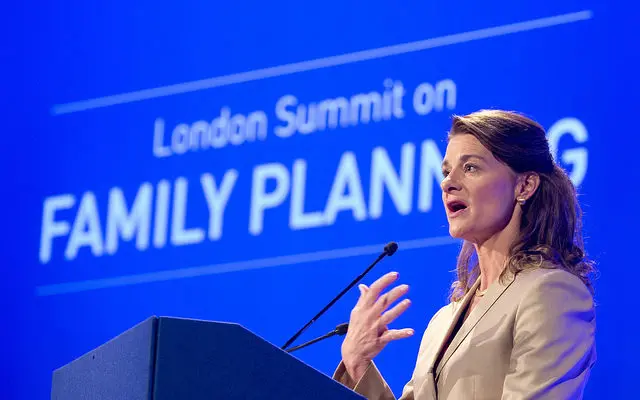
Melinda Gates at London Summit on Family Planning
Just imagine the good that could be done if this money were instead directed toward schools, roads, healthcare that does not kill, and clean water. As Obianuju Ekeocha said, “That would mean freedom for the African people, and that would help us stand up and walk on our own. It would mean that the African people could finally tear away from this horrible string of dependence on the donor.”
How Do We Combat This?
It is clear that population control efforts are inherently anti-life and anti-family. They promote a culture of death where children are thought of as burdens, where their lives are callously taken away via abortion, and where men are increasingly held less responsible as their partners are encouraged to dispose of the baby who resulted from their union.
In Evangelium Vitae, St. John Paul II warned us about population control measures. He wrote:
Today an important part of policies which favour life is the issue of population growth. Certainly public authorities have a responsibility to “intervene to orient the demography of the population.” But such interventions must always take into account and respect the primary and inalienable responsibility of married couples and families, and cannot employ methods which fail to respect the person and fundamental human rights, beginning with the right to life of every innocent human being. It is therefore morally unacceptable to encourage, let alone impose, the use of methods such as contraception, sterilization and abortion in order to regulate births.
These “family planning services” also promote a form of utilitarianism, which teaches that a society should work toward a plan of action that seeks to provide the “greatest happiness of the greatest number.” In other words, it allows for some to be hurt in the hopes that the majority will benefit. But this practice does not take into account the fact that by destroying families, they are destroying communities and thus entire societies.

Pope St. John Paul II
Final Thoughts
Killing some people or reducing family size in an attempt to make the world less populated or to reduce “climate change” is not only erroneous thinking, but it’s born of selfishness, for it reduces human beings to things that can be used or discarded at will. Pope Francis recently told charity workers in Mongolia, “To truly do good, goodness of heart is essential: a commitment to seeking what is best for others. Commitment for the sake of remuneration is not true love; only love can overcome selfishness and keep this world going.”
Killing people and destroying families is not what is best for others. Families are the foundation of society. Societies thrive when families remain intact, when parents lovingly bring up their children, and when children then care for their parents as they age. This is the love that families beget and sustain.
Anyone who has children knows that they make a family richer just by their very existence. It is not family size we should limit, and it is not children we should destroy. These are not the ways to combat the ecological problems we have here on earth. To solve these problems, we must build up families, strengthen communities, implement plans to care for the earth that don’t involve contraception and abortion, and build and solidify infrastructure. This is what will make us stronger—as humans and as a society.
As HLI’s Brian Clowes wrote, “Children are not an obstacle to development, they are the hope for the future of any society. People are not the problem—they are the solution.”
Related Content
Susan Ciancio has a BA in psychology and a BA in sociology from the University of Notre Dame, with an MA in liberal studies from Indiana University. Since 2003, she has worked as a professional editor and writer, editing both fiction and nonfiction books, magazine articles, blogs, educational lessons, professional materials, and website content. Fourteen of those years have been in the pro-life sector. Currently Susan writes weekly for HLI, edits for American Life League, and is the editor of its Celebrate Life Magazine. She also serves as executive editor for the Culture of Life Studies Program, an educational nonprofit program for k-12 students.



